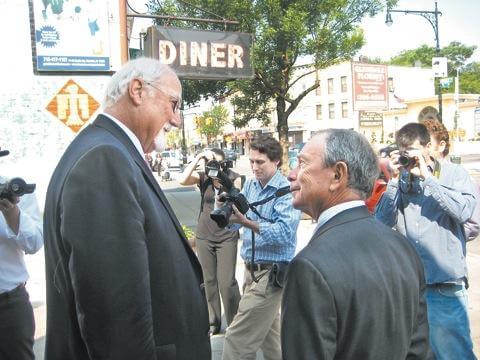By Philip Newman and Jeremy Walsh
“Everything comes quickly, at a reasonable price,” Mayor Michael Bloomberg said during a visit to Glendale Tuesday to tout his call for a “mass transit reform,” but Hizzoner was praising the fare at the Glendale Diner, not the current state of the Metropolitan Transit Authority.
Bloomberg, who has no direct control over the quasi-state agency, lacked specifics on how to finance the plan or get the MTA to implement changes like restoring F subway express trains, reopening Long Island Rail Road stations in Glendale, Richmond Hill and Elmhurst and providing free buses on some notoriously slow routes.
He said that the looming budget crisis the MTA and the city face in the 2011 fiscal year will make previously discarded proposals for change seem more desirable. Those proposals included the mayor’s controversial congestion pricing plan and the Assembly’s proposal to toll all city bridges. The MTA said last week it may just get through next year without fare hikes or service cuts but is in financial straits.
“You can’t answer this question with any one thing,” Bloomberg said. “They’re all on the table in a crisis.”
As mayor Bloomberg can only suggest changes to the MTA. He has no legal role in operating public transportation, although the mayor controls the appointment of four of the 17 MTA board members.
“We also have the bully pulpit,” he said Tuesday, noting his recent negotiations with the state Senate over mayoral control of schools. “We’ve got a lot done because of that.”
The MTA said of the mayor’s plan: “We welcome the mayor’s input and look forward to working with him and other elected officials in finding ways to make the MTA more efficient and transparent while being certain the MTA has the funding it needs to continue providing critical services.”
In addition to reopening the LIRR stations, the plan would also explore the possibility of light rail or streetcar expansions in Queens East River neighborhoods and commuter vans in Bayside and other areas underserved by public transit.
“Now is the time to act,” said Bloomberg. “New Yorkers deserve better and more affordable services. Unfortunately, the lack of accountability and efficiency is crippling our service and rightfully eroding taxpayer confidence in the system. My plan puts government back on the side of the people and provides greater mass transit access virtually citywide.”
Bloomberg would also:
• provide free crosstown buses on select routes — first in Manhattan — to cut congestion and speed up travel. He said the free buses might also be extended to parts of Jamaica, which the MTA also has under consideration.
• install Countdown Clocks to inform bus and subway riders how long until the next one arrives. The MTA already has such clocks on the L subway line and has plans for such devices on the 34th Street bus.
• expand LIRR and Metro-North Railroad City Tickets to allow passengers to travel at a discount all the time rather than only on weekends.
• restore F subway service to reduce crowding and speed commuting times.
• reopen LIRR stations in Glendale, Richmond Hill and Elmhurst to serve Queens residents through use of the City Ticket.
• explore the possibility of light rail and streetcar expansion in Queens East River waterfront neighborhoods.
• use “Open Road” and gateless tolls to reduce pollution and backups in west and northeast Queens, south and eastern Bronx, northern Brooklyn, northern Manhattan and the east shore of Staten Island.
• have more livery cabs and commuter vans serve underserved communities, with Bayside and Co-op City in the Bronx as the first places to try out such new services.
Bloomberg is seeking a third term as mayor and his political opponent, city Comptroller William Thompson, characterized Bloomberg’s plan as “empty promises and stolen ideas.”
Thompson suggested voters keep in mind that under Bloomberg transit fares have risen 50 percent and that New York City transit riders pay the nation’s highest percentage of transit costs.
Gene Russianoff, attorney for the Straphangers Campaign, a transit advocacy group, said of the Bloomberg plan: “Here are some ideas worth considering, but essentially, they are campaign promises.”
Reach contributing writer Philip Newman by e-mail at timesledgernews@cnglocal.com or phone at 718-229-0300, Ext. 136.


































